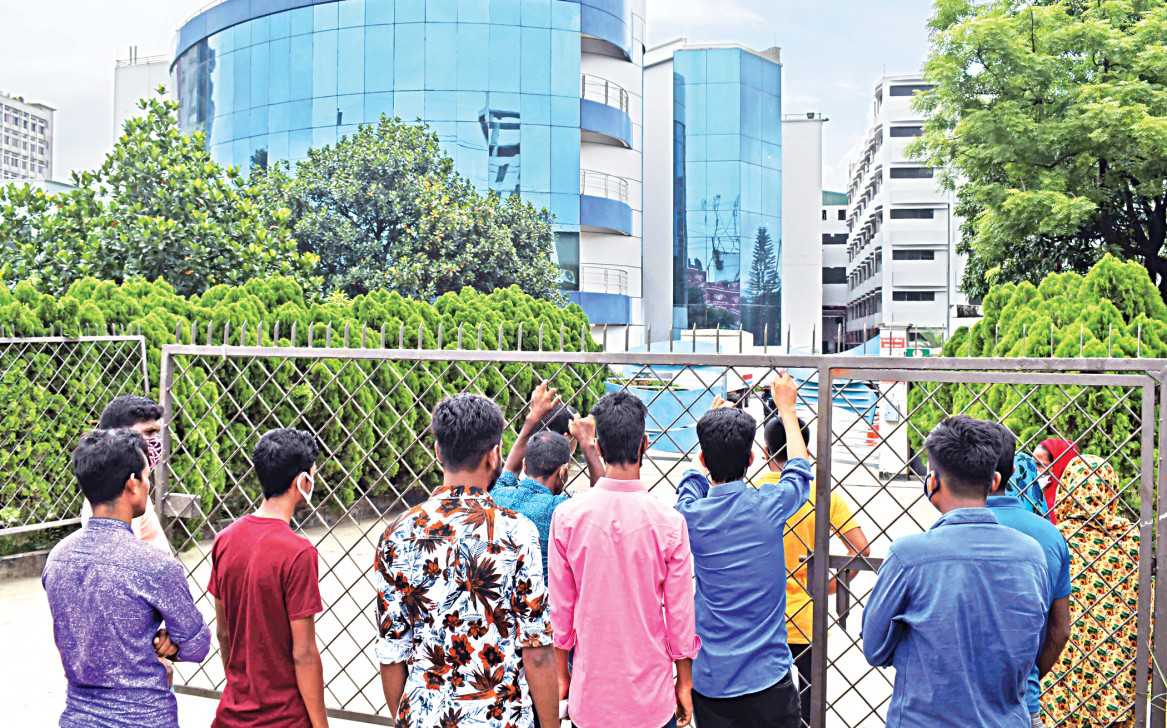Misleading, exaggerated, dated

Image collected
The findings of the Bangladesh Institute of Labour Studies (BILS) on job losses and shuttering of garment factories for the coronavirus pandemic have already been trashed by the Bangladesh Garment Manufacturers and Exporters Association (BGMEA) and the Department of Inspection for Factories and Establishments (DIFE).
At a press conference in National Press Club on Thursday, BILS said the layoffs and shuttering involved some 1,915 garment factories although some 324,684 personnel lost their jobs between April and July.
Moreover, some 60 % of the staff were apprehending losing their jobs as a fallout of the coronavirus, the report stated.
The BILS higher-ups said the analysis was carried out with information provided by DIFE, BGMEA and the Industrial Police.
However, both DIFE and BGMEA said the quantity of layoffs and shuttering had not been as high as was presented in the analysis.
In a press statement yesterday, BGMEA categorically disagreed with the findings.
"It could not be an exaggeration if the analysis report is termed as the default of morality," the statement read.
Some 300 small and medium factories, the majority of which focus on subcontracts, had shut down during the study period, said Rezwan Selim, a director of BGMEA who handles labour issues and factory shutdowns.
These small BGMEA-member factories could not avail government soft loans at 2 % service charge because they could not fulfil most of the conditions and conditions, he said.
About 48,000 employees have lost their jobs around Dhaka plus they are from the subcontracting factories that were not obtaining work orders from their mother factories.
"The BILS figures are too much and misleading," he said, adding that the factories, more often than not, are running at 70 % capacity now as the buyers are returning.
He continued to cite recent export figures to further his point about the inaccuracy of the BILS figures.
Between 1 and 22 August, garment export from Bangladesh increased 45.8 % year-on-year to $2.4 billion.
"If the job terminations and shuttering of factories had been as high as BILS mentioned, the export figures wouldn't normally have risen by such a margin," he added.
The study's findings were inconsistent with what was in reality, said Shibnath Roy, inspector general of DIFE.
About 26,000 staff were terminated in this pandemic, according to DIFE.
A few factories did turn off and some workers have been laid off at the start of April however the figures aren't as high as BILS stated, he said.
Moreover, some small and medium factories either shut down or went for layoffs for a limited period in April and May, he said.
Although government instructed a general shutdown from 26 March, it was not applicable on factories with production ongoing predicated on work orders accessible.
Officially, DIFE never instructed the factory owners to turn off or go for layoffs through the pandemic, Roy said.
"The problem in the garment sector is quite peaceful now as the number of incidents of labour unrest is quite few, almost zero."
The international retailers are returning and the factories are running quite nicely.
Actually, this month DIFE didn't receive any complaint from any worker or union about terminations or factory shutdowns, Roy added.
Some 26 member factories reported shutting down while no factory reported layoffs, said Mohammad Hatem, vice-president of the Bangladesh Knitwear Manufacturers and Exporters Association.
"The BILS data is too high," he added.
Amirul Haque Amin, the vice-chairman of BILS, admitted that the analysis had a whole lot of limitations.
The report's findings are in least 8 weeks old.
"By this time, the problem in the garment sector improved a whole lot as there was minimal labour unrest for payment and termination. We ought to have updated the amount of job losses and factory shutdowns," Amin told The Daily Star over the phone.
Moreover, international retailers are actually coming back with a whole lot of work orders while many are reissuing cancelled work orders to the neighborhood suppliers.
"The report must have contained the most recent updates in order that no confusion was created among the people," he said, adding that many of the sector's positive facts have not been reflected.
That the analysis had limitations and really should have incorporated the most recent updates were agreed after by the BILS Director Nazma Yesmin.
She assured providing the most recent information to the media soon to avert any confusion.
Source: https://www.thedailystar.net
Tags :
Previous Story
- Coronavirus disruptions deal severe blow to Bangladesh's garment...
- Job cut threat a trick of RMG owners...
- BGMEA: No ‘announcement’ made on layoffs
- Thousands of garment staff lose jobs
- EU to provide €113m as wages for 1m...
- 90 workers in commercial zones’ factories under IP...
- Coronavirus risks pushing an incredible number of Bangladeshis...
- Export-oriented factories should be opened up slowly maintaining...